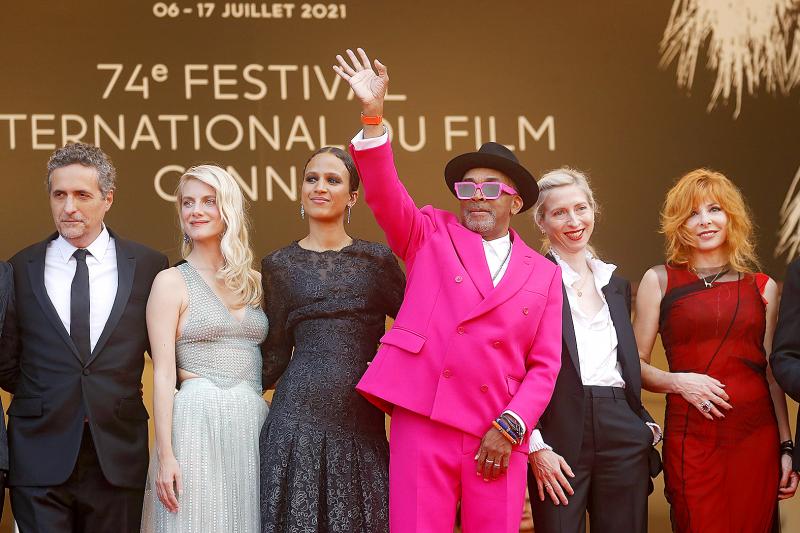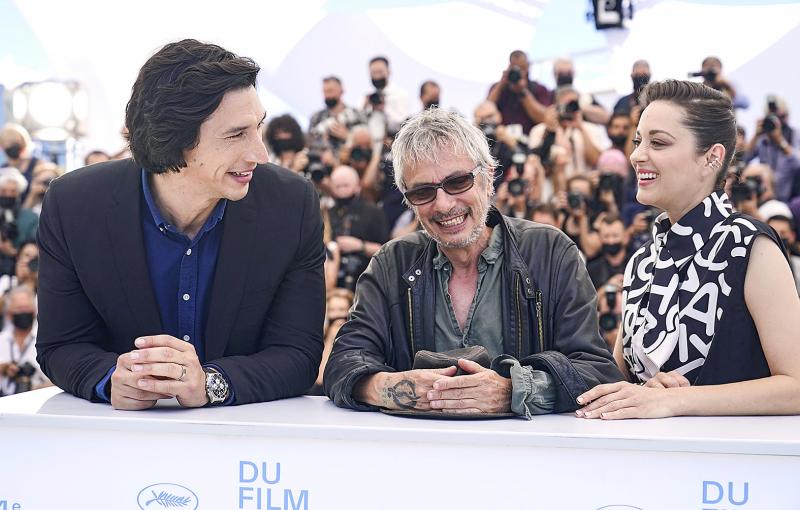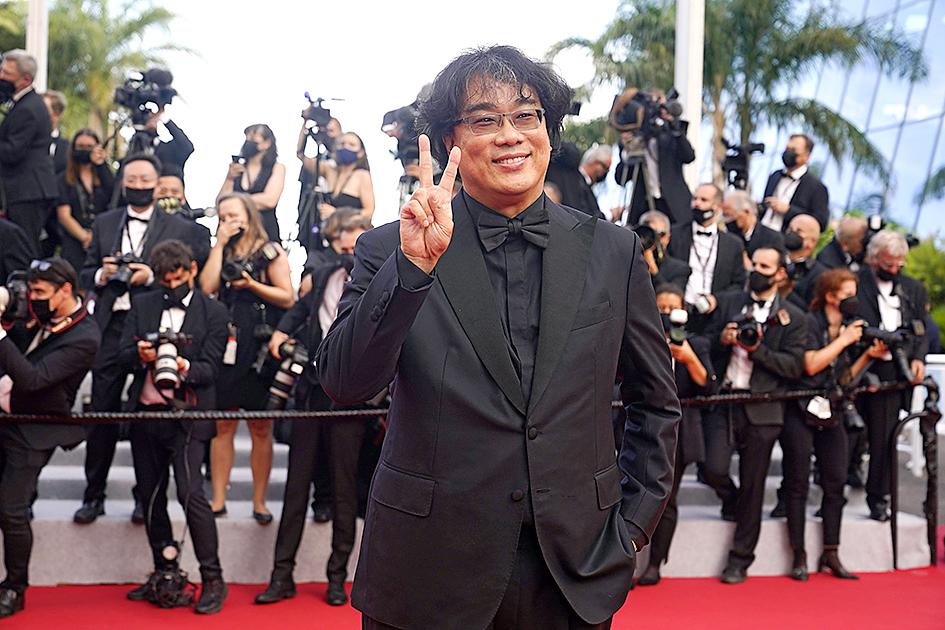The Cannes Film Festival rolled out the red carpet for the first time in more than two years on Tuesday, launching the French Riviera spectacular with the premiere of Leos Carax’s Annette, the introduction of Spike Lee’s jury, and with high hopes for shrugging off a punishing pandemic year for cinema.
The 74th Cannes opened Tuesday with as much glitz as it could summon, led by Annette, a fantastical musical starring Adam Driver and Marion Cotillard and scored by the musical duo Sparks. The opening ceremony also returned last year’s Palme d’Or winner, Bong Joon-ho (for Parasite) and Jodie Foster, who first came to Cannes as a 13-year-old with Martin Scorsese’s Taxi Driver, for an honorary Palme.
The occasion drew a wide spectrum of film luminaries back to Cannes to celebrate the festival, canceled last year due to the COVID-19 virus. Pedro Almodovar, Jessica Chastain, Helen Mirren and Bella Hadid walked the red carpet, which was again lined with tuxedoed photographers and surrounded by eager onlookers.

Photo: EPA-EFE
“So it feels good to go out,” said Foster in French.
“Vivre la France!” declared Lee.
The festival was officially declared open by Bong, Almodovar, Foster and Lee, in a mix of Korean, Spanish, French and English. Over the next 10 days, the Cannes Film Festival will try to resuscitate global cinema on a grand scale.

Photo: AP
Cannes has pushed ahead in much its usual form, with splashy red-carpet displays and a lineup of many of the world’s most revered filmmakers, including Asghar Farhadi, Wes Anderson, Mia Hansen-Love and Paul Verhoeven. Festivalgoers are tested every 48 hours, seated shoulder to shoulder and masked for screenings.
Lee, who is heading the jury that will decide this year’s Palme, arrived earlier in the day wearing a “1619” baseball hat and trying to keep a low profile.
“I’m not trying to be a hog,” he said to reporters, urging them to ask his fellow jurors questions.

Photo: AP
But Lee’s presence was hard to ignore. His face as Mars Blackmon from his 1986 feature film debut She’s Gotta Have It (which premiered at Cannes) adorns this year’s poster at the festival central hub, the Palais des Festivals. Lee is the first Black person to ever lead Cannes’ prestigious jury. In his first comments, in response to a question from Chaz Ebert, widow of Roger Ebert, Lee spoke about how little has changed since 1989’s Do the Right Thing — which made a controversial debut at Cannes.
“When you see brother Eric Garner, when you see king George Floyd murdered, lynched, I think of Ray (Radio) Raheem,” Lee said, referring to the Do the Right Thing character. After 30-plus years, you’d “think and hope,’’ Lee said, “that Black people would have stopped being hunted down like animals.”
Much of the talk on Tuesday at Cannes centered on injustice and survival. That the festival was even happening, after last year’s edition was canceled, was a surprise to some. Maggie Gyllenhaal, who’ll see the 24 films in competition for the Palme as a member of the jury over the next 12 days, said it will be her first time in a movie theater in 15 months. When Parasite actor Song Kang-ho was invited to be a juror, he said, “I thought: Will there really be a festival?”
“The fact that we’re here today, it’s really a miracle,” said Song.
Still, much of the usual pomp is toned down this year. There’s a relative dearth of promotion up and down Cannes’ oceanfront promenade, the Croisette, and Hollywood has less of a role than in years past. Brazilian director Kleber Mendonça Filho (Bacurau), a juror, added that in some parts of the world, cinema is under siege. In President Jair Bolsonaro’s Brazil, he said, the national cinematheque has been closed and its staff dismantled.
“This is a very clear demonstration of contempt for cinema and for culture,” said Filho, who noted the tragedy of Brazil reaching 500,000 dead from COVID-19 when, he said, many thousands could have been saved by a stronger governmental response.
That conversation was prompted in part by a Georgian journalist who asked jury members about resistance. Russia invaded the former Soviet republic in 2008.
“The world is run by gangsters,” said Lee, listing former US President Donald Trump, Bolsonaro and Russian President Vladimir Putin.
In that context, the regular topics of concern at Cannes were perhaps dwarfed. But the jurors made passionate cases for the future of movies — and a more inclusive future. This year’s competition lineup includes a Cannes-high four female filmmakers, but they still make up a fraction of the 24 filmmakers vying for the Palme.
“I think when women are listening to themselves and really expressing themselves, even inside, about a very, very male culture, we make movies differently. We tell stories differently,” said Gyllenhaal. She recalled watching Jane Campion’s The Piano (the lone film directed by a woman to ever win the Palme) as formative and unfiltered. “It just went in straight.”
The rise of streaming also took the spotlight. Cannes has refused to select films without French theatrical distribution for its competition lineup. The festival and Netflix have been at odds for several years. On Monday, Thierry Fremaux, festival director, cited Cannes’ record at discovering filmmakers and asked: “What directors have been discovered by [streaming] platforms?”
Lee, who made last year’s Da 5 Bloods for Netflix, hardly bated an eye when asked about the subject.
“Cinema and screening platforms can coexist,” said Lee, who called Cannes “the world’s greatest film festival.” “At one time, there was a thinking that TV was going to kill cinema. So, this stuff is not new.”

As we live longer, our risk of cognitive impairment is increasing. How can we delay the onset of symptoms? Do we have to give up every indulgence or can small changes make a difference? We asked neurologists for tips on how to keep our brains healthy for life. TAKE CARE OF YOUR HEALTH “All of the sensible things that apply to bodily health apply to brain health,” says Suzanne O’Sullivan, a consultant in neurology at the National Hospital for Neurology and Neurosurgery in London, and the author of The Age of Diagnosis. “When you’re 20, you can get away with absolute

When the South Vietnamese capital of Saigon fell to the North Vietnamese forces 50 years ago this week, it prompted a mass exodus of some 2 million people — hundreds of thousands fleeing perilously on small boats across open water to escape the communist regime. Many ultimately settled in Southern California’s Orange County in an area now known as “Little Saigon,” not far from Marine Corps Base Camp Pendleton, where the first refugees were airlifted upon reaching the US. The diaspora now also has significant populations in Virginia, Texas and Washington state, as well as in countries including France and Australia.

On April 17, Chinese Nationalist Party (KMT) Chairman Eric Chu (朱立倫) launched a bold campaign to revive and revitalize the KMT base by calling for an impromptu rally at the Taipei prosecutor’s offices to protest recent arrests of KMT recall campaigners over allegations of forgery and fraud involving signatures of dead voters. The protest had no time to apply for permits and was illegal, but that played into the sense of opposition grievance at alleged weaponization of the judiciary by the Democratic Progressive Party (DPP) to “annihilate” the opposition parties. Blamed for faltering recall campaigns and faced with a KMT chair

A police station in the historic sailors’ quarter of the Belgian port of Antwerp is surrounded by sex workers’ neon-lit red-light windows. The station in the Villa Tinto complex is a symbol of the push to make sex work safer in Belgium, which boasts some of Europe’s most liberal laws — although there are still widespread abuses and exploitation. Since December, Belgium’s sex workers can access legal protections and labor rights, such as paid leave, like any other profession. They welcome the changes. “I’m not a victim, I chose to work here and I like what I’m doing,” said Kiana, 32, as she